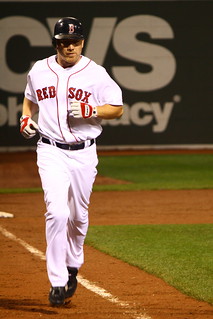
J.D. Drew (Flickr.com/-nanio-)
Perception is a funny thing.
Dale Murphy was a two-time National League Most Valuable Player Award winner. He went to seven All-Star Games and won five Gold Gloves and four Silver Sluggers. Last week, 106 members of the Baseball Writers’ Association of America voted for Murphy for the Baseball Hall of Fame.
J.D. Drew finished sixth in the NL MVP voting once, in 2004. He made an American League All-Star team in 2008. When Drew hits the Hall of Fame ballot in 2017, he might receive a couple of votes; he likely won’t garner the five percent needed to stay on the ballot.
According to Baseball Reference, Murphy compiled 42.6 WAR in 18 big league seasons. That’s tied for 358th all time. Murphy’s peak WAR – or his total WAR from his top seven seasons – was 39. His best season came in 1987, when he produced 7.4 WAR.
Drew compiled 42.4 WAR in 14 seasons, tied for 362nd in baseball history. His peak WAR was 30.8, and his best season came in 2004, an 8.1 WAR campaign for Atlanta.
Comparing the two, Murphy’s prime was clearly better than Drew’s; though Drew’s best season outpaced Murphy’s. They produced roughly equal value throughout their careers, but Drew was more consistent. Drew also produced more value on per-year basis, again speaking to his consistency.
Murphy is one of the most beloved players from his generation, credited for playing the game the right way and his likeable personality with fans and the media. It’s the reason why veteran Philadelphia Inquirer reporter Bob Brookover voted for Murphy – and only Murphy – on his 2013 Hall of Fame ballot.
Drew, on the other hand, is one of the most disdained players of his generation. And he’s hated by two different cities – for two different, almost contradictory reasons.
In 1997, the Philadelphia Phillies selected Drew with the second overall pick in the June Amateur draft. A star outfielder at Florida State University, Drew was the first player in college baseball history to hit 30 homers and swipe 30 bases in the same season. He was the answer to the prayers of desperate fans across the Delaware Valley.
But with super agent Scott Boras pulling the strings, Drew refused to accept the Phillies’ $2.6 million dollar offer; he wouldn’t take anything less than $10 million. He never signed in Philadelphia, and instead played the 2007 season in an independent league.
In 1998, Drew was drafted by the St. Louis Cardinals and signed a $7 million contract. He effectively dissed one of the most passionate and unforgiving fan bases in the country, and he never lived it down.
Drew made his first appearance at Veterans Stadium in 1999, and drew a wild amount of boos (and raining batteries) from the outraged crowd. It was unprecedented hatred of an opposing player, even for Philadelphia standards. Every time Drew came back to the City of Brotherly Love, the boos came back to greet him.
Now flash forward to 2007, when Drew signed a five-year, $70 million deal with the Red Sox. At this point in Drew’s career, he had established a persona of quiet consistency. He wasn’t flashy, but he could clearly hit, having not posted an OPS+ under 126 in his previous four seasons.
But apparently, this was not good enough for Sox fans. Despite putting up OPS+ of 105, 138, 134 and 109 in his first four seasons in Boston, the Fenway Faithful inaptly labeled him as “soft.” The nickname “Nancy Drew” became the standard. Somehow, even though Drew was one of the more patient hitters on the team during his tenure, he became known as the guy who would leave the bat on his shoulders in clutch situations.
To recap: Red Sox fans hated J.D. Drew because they thought he was a bad baseball player. Meanwhile, Phillies fans hated Drew because he dissed them. But if Drew really were a bad player, Phillies fans would have no reason to care; they’d actually be relieved that he never signed there. In effect, Phillies fans hated Drew because they thought he was a very good player.
And so Drew remains one of the most hated players of his generation, by two different cities, for the opposite reason. He was a quiet guy, who did his job, did it pretty well, and never asked for anything. By no account was he brash with fans and the media; but there’s nothing to suggest that he was a superlative personality, either.
Drew and Dale Murphy were identical players on the field. In fact, it’s almost impossible to find two players more comparable. They were both very good; not great.
But thanks to perception, one is an all-time favorite, a Hall of Famer to one-fifth of the sitting voters. The other is a guy who ran into unfortunate circumstances and a misguided public.
